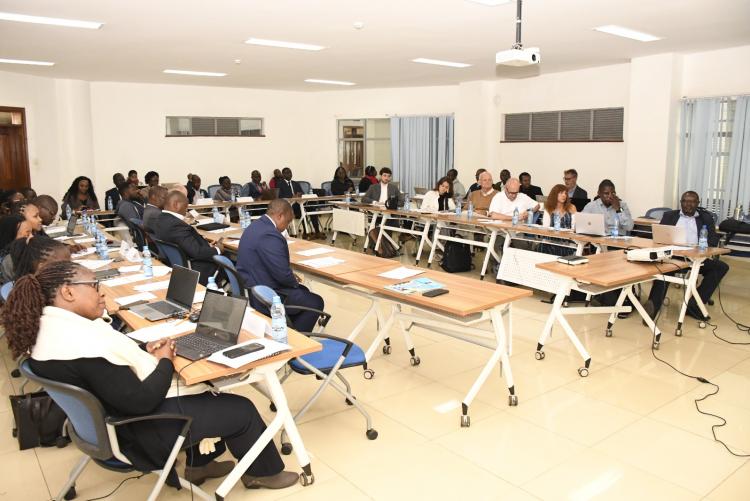The University of Nairobi Faculty of law hosted a groundbreaking Climate Justice Workshop, focusing on climate change mitigation, adaptation, and compensation. The event, held on September 5th, 2024, brought together researchers, policymakers, and stakeholders to discuss sustainable approaches to climate action and explore the complex interplay between climate change strategies and social justice.
Prof. Justus Munyoki, Director, Research Innovation and Enterprise, officially opened the workshop, emphasizing the university's commitment to addressing climate change through research and practical solutions. He stressed the importance of moving beyond academic discourse to create tangible impacts in marginalized communities most affected by climate shocks. "We need to move out of classrooms and boardrooms and interact with those at the heart of the society," Prof. Munyoki stated, highlighting the university's ongoing efforts to ensure research reaches vulnerable communities. He particularly praised the gender-responsive livestock insurance package aimed at safeguarding the livelihoods of agro-pastoral communities, describing it as a critical initiative in helping these communities withstand the effects of climate change. Prof Munyoki also emphasized the need for collaboration between the university, international partners, and local stakeholders to ensure that these initiatives contribute meaningfully to Kenya’s overall climate resilience.
Prof. Richard Mulwa, representing the Dean of the Faculty of Law, addressed the critical need for a justice-centered approach in tackling climate change. He elaborated on the two main strategies for addressing the crisis: mitigation and adaptation. While mitigation focuses on reducing emissions to achieve net-zero targets, adaptation deals with adjusting to climate impacts, which vary from region to region. Prof. Mulwa emphasized that both strategies must incorporate justice, ensuring that marginalized and vulnerable groups are not excluded from the benefits of climate actions.
He further highlighted the principles of distributive, restorative, and procedural justice. These principles advocate for the fair distribution of climate action benefits, correction of historical wrongs, and inclusion of affected communities in decision-making processes. Prof. Mulwa pointed to projects like the Kenya Livestock Insurance Programme (BIMA), as examples of how inclusivity can drive real change, particularly for marginalized communities like pastoralists. His message was clear: climate justice is not just about reducing emissions, but ensuring equity in the fight against climate change.
The keynote address by Prof. Lukas Meyer from Graz University delved deeper into the moral dimensions of climate justice. He outlined the necessity of sharing the burden of climate change mitigation equitably, critiquing existing approaches like Equal Per Capita and Contraction and Convergence for overlooking key normative dimensions. Prof. Meyer also discussed the importance of compensating those who suffer the most from climate change those who contribute the least to the problem but bear the greatest burdens.
Prof. Meyer’s address further explored the concept of loss and damage and the obligations of high-emission entities to rectify their past wrongs through compensatory justice. He argued that the duty to compensate goes beyond financial reparation, extending to ensuring the well-being of affected communities. His speech left a profound impression on participants, reinforcing the idea that climate justice must be at the heart of global climate policies.
Prof. Nicholas Oguge, the Principal Investigator for the BIMA project, presented key insights on the evolving discourse surrounding climate justice. He emphasized the need to shift the conversation from purely environmental concerns to include the social impact of climate change, particularly on vulnerable communities such as pastoralists. Prof. Oguge introduced the innovative Index-Based Livestock Insurance (IBLI) system, designed to provide financial protection for livestock keepers in pastoral communities frequently devastated by extreme weather events. This satellite-based system offers a more scalable and efficient solution for rural communities, representing a tangible form of climate risk management. The workshop also featured a panel discussion on policies and mechanisms for livestock insurance. Panelists discussed what needs to be done to build long-term sustainability and enhance the impacts of IBLI as a tool in policy programming.
The workshop also provided a platform for PhD and Masters Students to present their research concepts, fostering an environment of academic exchange and future collaboration.Participants engaged in interactive exchanges, deepening the discourse on climate justice and exploring practical solutions for vulnerable communities. The event underscored the University of Nairobi's central role in Kenya's fight against climate change, leveraging research and innovation to address real-world challenges and enhance community development.
As the workshop concluded, it was clear that the path to climate justice requires a multifaceted approach, combining rigorous academic research, innovative financial solutions, and a steadfast commitment to equity and inclusivity. The University of Nairobi, through events like this and projects such as BIMA, continues to lead the way in creating meaningful change in the face of the global climate crisis.

